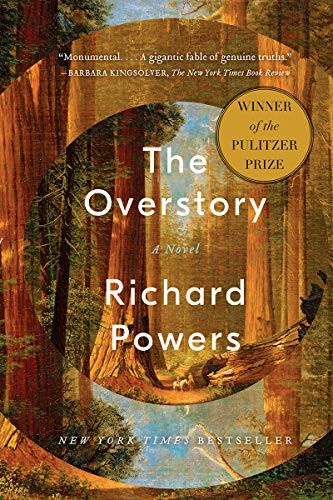sol2070 reviewed The Overstory by Richard Powers
The Secret of Trees
5 stars
(em português → sol2070.in/2023/09/O-segredo-das-%C3%A1rvores)
I think "The Overstory" (2018), by Richard Powers, was the best fiction I've ever read. "I think" because I didn't stop to create a ranking, but I can't remember anything so powerful.
I finished a second reading with a more intense impression than the first. In recent years, this was one of the only books I wanted to re-read immediately after finishing -- the other was Jeff Vandermeer's "Southern Reach" trilogy.
They say that the perfect book is the one you finish with the feeling of not being the same person anymore. A critic said that about "The Overstory" and, yes, absolutely. The work -- which won the Pullitzer Prize for best fiction in 2019 -- manages to open up perception and empathy with other beings in this profound dimension of the interconnectedness of life.
It's a story that gradually interconnects the lives of nine people with trees. The main difference is that it positions these plants as a kind of central character, in an active and almost demiurgic way.
As the author says, we imagine that reality is what we perceive in front of us. The problem with this view is that it is limited to the time of human perception. Trees, on the other hand, move, "talk" and even store memories on a much slower scale, to the point of being almost invisible. Only in the last few decades have things like tree communication, cooperation and intelligence begun to be seriously studied.
An old scifi pulp story, mentioned in passing in the book, illustrates this human blindness. Earth is invaded by an advanced alien species that is not only tiny, but very fast. One human second is equivalent to one year of these aliens. They perceive people as gigantic statues. They try to study them and even communicate, but get no response. Concluding that there is no sentience there, they destroy everything to feed themselves.
There is another passage that demonstrates this central theme: life that is able to recognize itself in other forms of life. In the book, a lawyer mentions that the history of humanity could be summed up in the gradual expansion of rights to people who previously had none. In ancient times, children were not considered people. Then they were. Then women, black people, native peoples, non-binary, etc. In countries with advanced culture, such as New Zealand, sentience is now being legally extended to various animals.
This book manages to convey the experience that nature, and especially plants, go far beyond being mere resources. We are all sentient beings. "Overstory" is a botanical term that refers to the upper cover of a forest but, considering the words involved, it could also means "all-encompassing story".
Fortunately, the book fully transcends ecological pamphleteering. Powers is one of America's most renowned authors. "The Overstory" is so well written that it makes the bestseller books sound like kids' writing. As I read, I remembered that the last time I came across such literary beauty was "Underworld", by Don DeLillo, or "Gravity's Rainbow", by Thomas Pynchon -- two celebrated novelists to whom Powers is often compared. For me, this was an aesthetic explosion because I don't usually read high literature, preferring to be entertained by "cheaper" things.
In addition to the enchanting writing, this book also shines in meaning, painting ecology in cosmo-existential tones. It basically delivers the great transcendent-immanent experience that I always mention - when I comment about Spinoza, psychedelics, philosophy of consciousness etc. It often provokes tears, not for sad or beautiful unfoldings, but for emotions as vast as life.
When I read it for the first time, about three years ago, I liked it so much that I couldn't put it down and finished it in a few sittings. Now, in the second edition, many other aspects have opened up, such as the magic of the sentences, the depth of the characters, symbolism, new connections between apparently separate stories...
At one peak moment, literally, of the story, an activist camped out in civil disobedience on top of a giant sequoia with his new life partner, who is a kind of modern prophetess, amidst the rubble of the socio-environmental saga in which his existence has been turned upside down, admits with nostalgia something like: "I think the curve of my life has just reached its peak. Everything that comes after will never compare...". "The Overstory" manages to transfuse emotions like this directly into the heart.
It's a shame about the current decline of the Brazilian publishing market, which is lacking so many exceptional books like this one. The good news is that the producers of the acclaimed series "Game of Thrones", who say they love this book, are going to adapt it into a Netflix miniseries.
This will come after another fabulous adaptation they are finalizing, that of the scifi trilogy "The Three Body Problem". I think this is the best "first contact" story I've ever read, but that's for another post.

